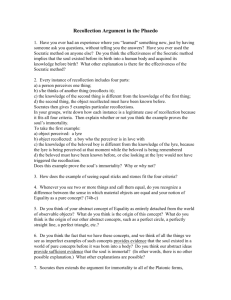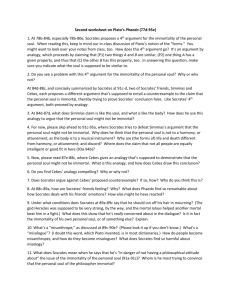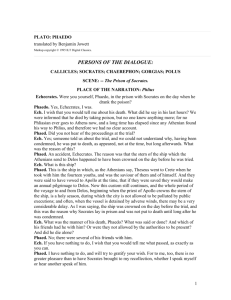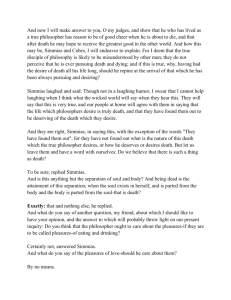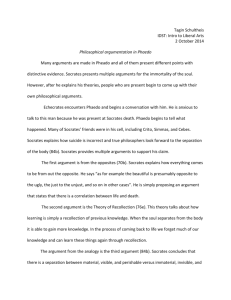Phaedo, part two: Recollection of the Soul
advertisement
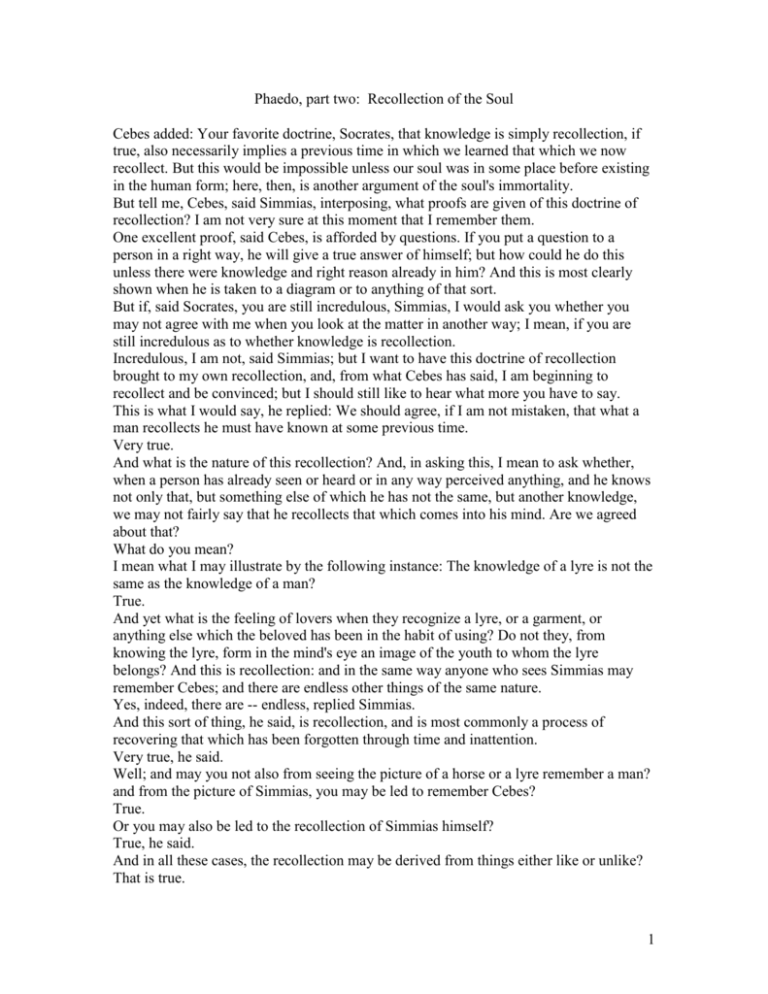
Phaedo, part two: Recollection of the Soul Cebes added: Your favorite doctrine, Socrates, that knowledge is simply recollection, if true, also necessarily implies a previous time in which we learned that which we now recollect. But this would be impossible unless our soul was in some place before existing in the human form; here, then, is another argument of the soul's immortality. But tell me, Cebes, said Simmias, interposing, what proofs are given of this doctrine of recollection? I am not very sure at this moment that I remember them. One excellent proof, said Cebes, is afforded by questions. If you put a question to a person in a right way, he will give a true answer of himself; but how could he do this unless there were knowledge and right reason already in him? And this is most clearly shown when he is taken to a diagram or to anything of that sort. But if, said Socrates, you are still incredulous, Simmias, I would ask you whether you may not agree with me when you look at the matter in another way; I mean, if you are still incredulous as to whether knowledge is recollection. Incredulous, I am not, said Simmias; but I want to have this doctrine of recollection brought to my own recollection, and, from what Cebes has said, I am beginning to recollect and be convinced; but I should still like to hear what more you have to say. This is what I would say, he replied: We should agree, if I am not mistaken, that what a man recollects he must have known at some previous time. Very true. And what is the nature of this recollection? And, in asking this, I mean to ask whether, when a person has already seen or heard or in any way perceived anything, and he knows not only that, but something else of which he has not the same, but another knowledge, we may not fairly say that he recollects that which comes into his mind. Are we agreed about that? What do you mean? I mean what I may illustrate by the following instance: The knowledge of a lyre is not the same as the knowledge of a man? True. And yet what is the feeling of lovers when they recognize a lyre, or a garment, or anything else which the beloved has been in the habit of using? Do not they, from knowing the lyre, form in the mind's eye an image of the youth to whom the lyre belongs? And this is recollection: and in the same way anyone who sees Simmias may remember Cebes; and there are endless other things of the same nature. Yes, indeed, there are -- endless, replied Simmias. And this sort of thing, he said, is recollection, and is most commonly a process of recovering that which has been forgotten through time and inattention. Very true, he said. Well; and may you not also from seeing the picture of a horse or a lyre remember a man? and from the picture of Simmias, you may be led to remember Cebes? True. Or you may also be led to the recollection of Simmias himself? True, he said. And in all these cases, the recollection may be derived from things either like or unlike? That is true. 1 And when the recollection is derived from like things, then there is sure to be another question, which is, whether the likeness of that which is recollected is in any way defective or not. Very true, he said. And shall we proceed a step further, and affirm that there is such a thing as equality, not of wood with wood, or of stone with stone, but that, over and above this, there is equality in the abstract? Shall we affirm this? Affirm, yes, and swear to it, replied Simmias, with all the confidence in life. And do we know the nature of this abstract essence? To be sure, he said. And whence did we obtain this knowledge? Did we not see equalities of material things, such as pieces of wood and stones, and gather from them the idea of an equality which is different from them? -- you will admit that? Or look at the matter again in this way: Do not the same pieces of wood or stone appear at one time equal, and at another time unequal? That is certain. But are real equals ever unequal? or is the idea of equality ever inequality? That surely was never yet known, Socrates. Then these (so-called) equals are not the same with the idea of equality? I should say, clearly not, Socrates. And yet from these equals, although differing from the idea of equality, you conceived and attained that idea? Very true, he said. Which might be like, or might be unlike them? Yes. But that makes no difference; whenever from seeing one thing you conceived another, whether like or unlike, there must surely have been an act of recollection? Very true. But what would you say of equal portions of wood and stone, or other material equals? and what is the impression produced by them? Are they equals in the same sense as absolute equality? or do they fall short of this in a measure? Yes, he said, in a very great measure, too. And must we not allow that when I or anyone look at any object, and perceive that the object aims at being some other thing, but falls short of, and cannot attain to it -- he who makes this observation must have had previous knowledge of that to which, as he says, the other, although similar, was inferior? Certainly. And has not this been our case in the matter of equals and of absolute equality? Precisely. Then we must have known absolute equality previously to the time when we first saw the material equals, and reflected that all these apparent equals aim at this absolute equality, but fall short of it? That is true. And we recognize also that this absolute equality has only been known, and can only be known, through the medium of sight or touch, or of some other sense. And this I would affirm of all such conceptions. 2 Yes, Socrates, as far as the argument is concerned, one of them is the same as the other. And from the senses, then, is derived the knowledge that all sensible things aim at an idea of equality of which they fall short -- is not that true? Yes. Then before we began to see or hear or perceive in any way, we must have had a knowledge of absolute equality, or we could not have referred to that the equals which are derived from the senses -- for to that they all aspire, and of that they fall short? That, Socrates, is certainly to be inferred from the previous statements. And did we not see and hear and acquire our other senses as soon as we were born? Certainly. Then we must have acquired the knowledge of the ideal equal at some time previous to this? Yes. That is to say, before we were born, I suppose? True. And if we acquired this knowledge before we were born, and were born having it, then we also knew before we were born and at the instant of birth not only equal or the greater or the less, but all other ideas; for we are not speaking only of equality absolute, but of beauty, goodness, justice, holiness, and all which we stamp with the name of essence in the dialectical process, when we ask and answer questions. Of all this we may certainly affirm that we acquired the knowledge before birth? That is true. But if, after having acquired, we have not forgotten that which we acquired, then we must always have been born with knowledge, and shall always continue to know as long as life lasts -- for knowing is the acquiring and retaining knowledge and not forgetting. Is not forgetting, Simmias, just the losing of knowledge? Quite true, Socrates. But if the knowledge which we acquired before birth was lost by us at birth, and afterwards by the use of the senses we recovered that which we previously knew, will not that which we call learning be a process of recovering our knowledge, and may not this be rightly termed recollection by us? Very true. For this is clear, that when we perceived something, either by the help of sight or hearing, or some other sense, there was no difficulty in receiving from this a conception of some other thing like or unlike which had been forgotten and which was associated with this; and therefore, as I was saying, one of two alternatives follows: either we had this knowledge at birth, and continued to know through life; or, after birth, those who are said to learn only remember, and learning is recollection only. Yes, that is quite true, Socrates. And which alternative, Simmias, do you prefer? Had we the knowledge at our birth, or did we remember afterwards the things which we knew previously to our birth? I cannot decide at the moment. At any rate you can decide whether he who has knowledge ought or ought not to be able to give a reason for what he knows. Certainly, he ought. 3 But do you think that every man is able to give a reason about these very matters of which we are speaking? I wish that they could, Socrates, but I greatly fear that to-morrow at this time there will be no one able to give a reason worth having. Then you are not of opinion, Simmias, that all men know these things? Certainly not. Then they are in process of recollecting that which they learned before. Certainly. But when did our souls acquire this knowledge? -- not since we were born as men? Certainly not. And therefore previously? Yes. Then, Simmias, our souls must have existed before they were in the form of man -without bodies, and must have had intelligence. Unless indeed you suppose, Socrates, that these notions were given us at the moment of birth; for this is the only time that remains. Yes, my friend, but when did we lose them? for they are not in us when we are born -that is admitted. Did we lose them at the moment of receiving them, or at some other time? No, Socrates, I perceive that I was unconsciously talking nonsense. Then may we not say, Simmias, that if, as we are always repeating, there is an absolute beauty, and goodness, and essence in general, and to this, which is now discovered to be a previous condition of our being, we refer all our sensations, and with this compare them -- assuming this to have a prior existence, then our souls must have had a prior existence, but if not, there would be no force in the argument? There can be no doubt that if these absolute ideas existed before we were born, then our souls must have existed before we were born, and if not the ideas, then not the souls. Yes, Socrates; I am convinced that there is precisely the same necessity for the existence of the soul before birth, and of the essence of which you are speaking: and the argument arrives at a result which happily agrees with my own notion. For there is nothing which to my mind is so evident as that beauty, goodness, and other notions of which you were just now speaking have a most real and absolute existence; and I am satisfied with the proof. Well, but is Cebes equally satisfied? for I must convince him too. I think, said Simmias, that Cebes is satisfied: although he is the most incredulous of mortals, yet I believe that he is convinced of the existence of the soul before birth. But that after death the soul will continue to exist is not yet proven even to my own satisfaction. I cannot get rid of the feeling of the many to which Cebes was referring -the feeling that when the man dies the soul may be scattered, and that this may be the end of her. For admitting that she may be generated and created in some other place, and may have existed before entering the human body, why after having entered in and gone out again may she not herself be destroyed and come to an end? Very true, Simmias, said Cebes; that our soul existed before we were born was the first half of the argument, and this appears to have been proven; that the soul will exist after death as well as before birth is the other half of which the proof is still wanting, and has to be supplied. 4 But that proof, Simmias and Cebes, has been already given, said Socrates, if you put the two arguments together -- I mean this and the former one, in which we admitted that everything living is born of the dead. For if the soul existed before birth, and in coming to life and being born can be born only from death and dying, must she not after death continue to exist, since she has to be born again? surely the proof which you desire has been already furnished. 5
